高级翻译理论
- 格式:ppt
- 大小:302.50 KB
- 文档页数:36
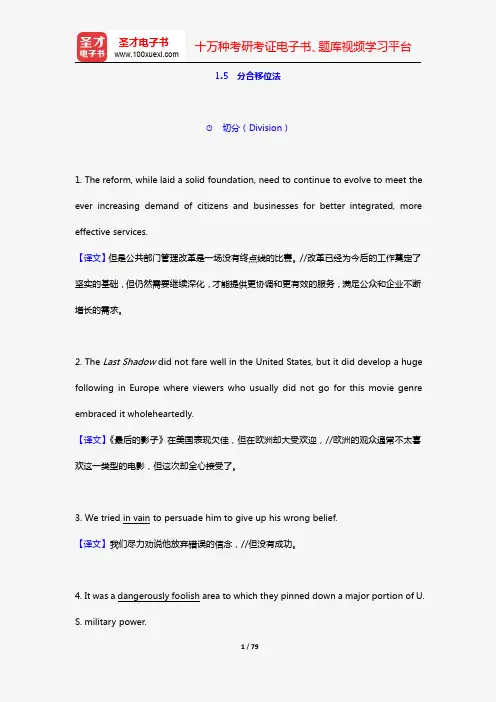
1.5分合移位法⊙切分(Division)1.The reform,while laid a solid foundation,need to continue to evolve to meet the ever increasing demand of citizens and businesses for better integrated,more effective services.【译文】但是公共部门管理改革是一场没有终点线的比赛。
//改革已经为今后的工作奠定了坚实的基础,但仍然需要继续深化,才能提供更协调和更有效的服务,满足公众和企业不断增长的需求。
2.The Last Shadow did not fare well in the United States,but it did develop a huge following in Europe where viewers who usually did not go for this movie genre embraced it wholeheartedly.【译文】《最后的影子》在美国表现欠佳,但在欧洲却大受欢迎,//欧洲的观众通常不太喜欢这一类型的电影,但这次却全心接受了。
3.We tried in vain to persuade him to give up his wrong belief.【译文】我们尽力劝说他放弃错误的信念,//但没有成功。
4.It was a dangerously foolish area to which they pinned down a major portion of U. itary power.【译文】他们把美国一大部分军事力量困在那个地区,//这(样做)是愚蠢而危险的。
5.Hitler’s black empire would suddenly collapse in rubble,blood,and flame. (Winds of War)【译文】希特勒的黑暗帝国顷刻之间就会在血泊与烈火中崩溃,//夷为废墟。
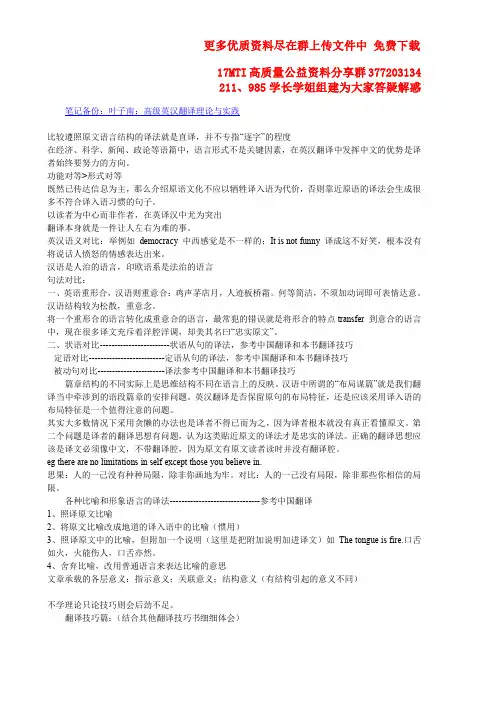
211、985学长学姐组建为大家答疑解惑笔记备份:叶子南:高级英汉翻译理论与实践比较遵照原文语言结构的译法就是直译,并不专指“逐字”的程度在经济、科学、新闻、政论等语篇中,语言形式不是关键因素,在英汉翻译中发挥中文的优势是译者始终要努力的方向。
功能对等>形式对等既然已传达信息为主,那么介绍原语文化不应以牺牲译入语为代价,否则靠近原语的译法会生成很多不符合译入语习惯的句子。
以读者为中心而非作者,在英译汉中尤为突出翻译本身就是一件让人左右为难的事。
英汉语义对比:举例如democracy中西感觉是不一样的;It is not funny译成这不好笑,根本没有将说话人愤怒的情感表达出来。
汉语是人治的语言,印欧语系是法治的语言句法对比:一、英语重形合,汉语则重意合:鸡声茅店月,人迹板桥霜。
何等简洁,不须加动词即可表情达意。
汉语结构较为松散,重意念。
将一个重形合的语言转化成重意合的语言,最常犯的错误就是将形合的特点transfer到意合的语言中,现在很多译文充斥着洋腔洋调,却美其名曰“忠实原文”。
二、状语对比------------------------状语从句的译法,参考中国翻译和本书翻译技巧定语对比--------------------------定语从句的译法,参考中国翻译和本书翻译技巧被动句对比-----------------------译法参考中国翻译和本书翻译技巧篇章结构的不同实际上是思维结构不同在语言上的反映。
汉语中所谓的“布局谋篇”就是我们翻译当中牵涉到的语段篇章的安排问题。
英汉翻译是否保留原句的布局特征,还是应该采用译入语的布局特征是一个值得注意的问题。
其实大多数情况下采用贪懒的办法也是译者不得已而为之,因为译者根本就没有真正看懂原文。
第二个问题是译者的翻译思想有问题,认为这类贴近原文的译法才是忠实的译法。
正确的翻译思想应该是译文必须像中文,不带翻译腔,因为原文有原文读者读时并没有翻译腔。
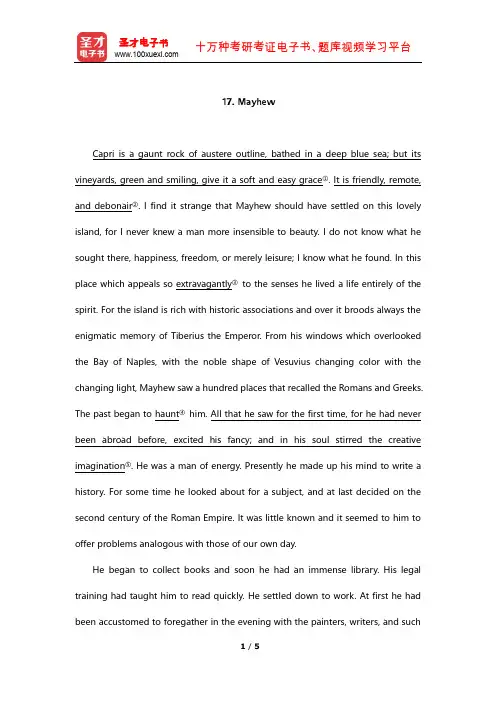
17. MayhewCapri is a gaunt rock of austere outline, bathed in a deep blue sea; but its vineyards, green and smiling, give it a soft and easy grace①. It is friendly, remote, and debonair②. I find it strange that Mayhew should have settled on this lovely island, for I never knew a man more insensible to beauty. I do not know what he sought there, happiness, freedom, or merely leisure; I know what he found. In this place which appeals so extravagantly③to the senses he lived a life entirely of the spirit. For the island is rich with historic associations and over it broods always the enigmatic memory of Tiberius the Emperor. From his windows which overlooked the Bay of Naples, with the noble shape of Vesuvius changing color with the changing light, Mayhew saw a hundred places that recalled the Romans and Greeks. The past began to haunt④him. All that he saw for the first time, for he had never been abroad before, excited his fancy; and in his soul stirred the creative imagination⑤. He was a man of energy. Presently he made up his mind to write a history. For some time he looked about for a subject, and at last decided on the second century of the Roman Empire. It was little known and it seemed to him to offer problems analogous with those of our own day.He began to collect books and soon he had an immense library. His legal training had taught him to read quickly. He settled down to work. At first he had been accustomed to foregather in the evening with the painters, writers, and suchlike who met in the little tavern near the Piazza, but presently he withdrew himself, for his absorption in his studies became more pressing. He had been accustomed to bathe in that bland sea and to take long walks among the pleasant vineyards, but little by little, grudging the time, he ceased to do so⑥. He worked harder than he had ever worked in Detroit. He would start at noon and work all through the night till the whistle of the steamer that goes every morning from Capri to Naples told him that it was five o’clock and time to go to bed. His subject opened out before him, vaster and more significant⑦, and he imagined a work that would put him forever beside the great historians of the past. As the years went by he was to be found seldom in the ways of men. He could be tempted to come out of his house only by a game of chess or the chance of an argument. He loved to set his brain against another’s⑧. He was widely read now, not only on history, but in philosophy and science; and he was a skillful controversialist, quick, logical, and incisive⑨. But he had good-humor⑩and kindliness; though he took a very human pleasure in victory⑪, he did not exult in it to your mortification.By William S. Maugham 【参考译文】卡普里岛在深蓝色的大海中,远远望去仿佛是一块朴实无华的荒凉的岩石。
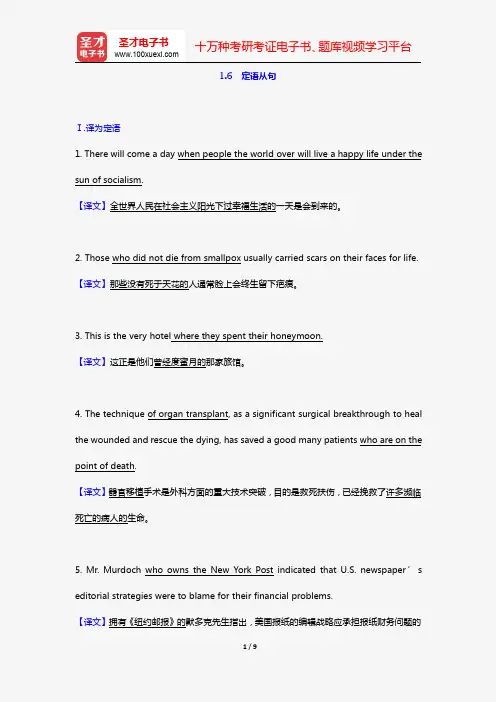
1.6定语从句Ⅰ.译为定语1.There will come a day when people the world over will live a happy life under the sun of socialism.【译文】全世界人民在社会主义阳光下过幸福生活的一天是会到来的。
2.Those who did not die from smallpox usually carried scars on their faces for life.【译文】那些没有死于天花的人通常脸上会终生留下疤痕。
3.This is the very hotel where they spent their honeymoon.【译文】这正是他们曾经度蜜月的那家旅馆。
4.The technique of organ transplant,as a significant surgical breakthrough to heal the wounded and rescue the dying,has saved a good many patients who are on the point of death.【译文】器官移植手术是外科方面的重大技术突破,目的是救死扶伤,已经挽救了许多濒临死亡的病人的生命。
5.Mr.Murdoch who owns the New York Post indicated that U.S.newspaper’s editorial strategies were to blame for their financial problems.【译文】拥有《纽约邮报》的默多克先生指出,美国报纸的编辑战略应承担报纸财务问题的责任。
【解析】这里的定语从句的翻译是典型的前置法。
翻译时按照汉语的习惯加个“的”字。
6.The people who worked for him lived in mortal fear of him.【译文】在他手下工作的人对他怕得要死。
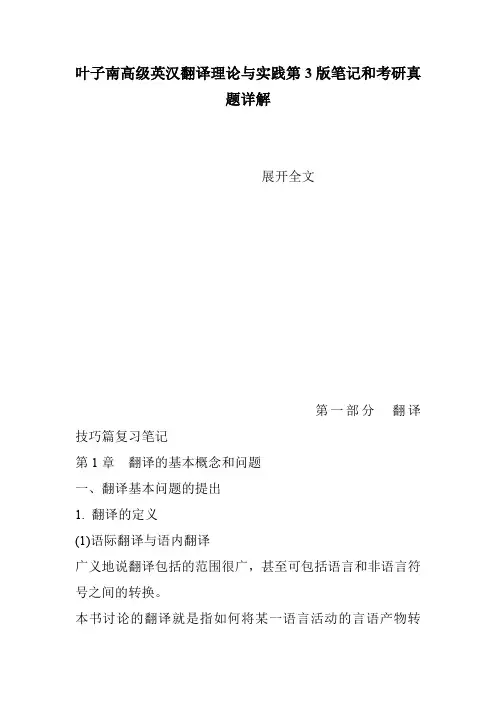
叶子南高级英汉翻译理论与实践第3版笔记和考研真题详解展开全文第一部分翻译技巧篇复习笔记第1章翻译的基本概念和问题一、翻译基本问题的提出1. 翻译的定义(1)语际翻译与语内翻译广义地说翻译包括的范围很广,甚至可包括语言和非语言符号之间的转换。
本书讨论的翻译就是指如何将某一语言活动的言语产物转换到另一语言中去,也就是语际(interlingual)翻译。
严格地说,翻译还应包括某一语言内不同变体间的转换,也就是语内(intralingual)翻译。
这两类翻译在本质上颇有雷同之处,而且其核心问题都是如何把原文的意思在译文中说出来。
(2) 探索翻译的新概念随着现代语言学的发展,各类应用语言学分支学科应运而生,探索翻译的工具越来越得心应手,出现了许多关于翻译的新的概念,如“忠实”、功能对等、等值、信达雅等等。
但翻译的本质仍然是在某一特定的社会环境内进行交流的过程。
概括来说,翻译的定义就是把原文中的意思在译文中表达出来。
2. 原文意思在译文中的表达在翻译过程中,有些句子如照字面直接译过来意思就会不够清楚。
(1) 句子中的有些意思会紧紧地结合在语言本身的形式上使得译者将语言的形式照搬。
例:It is a truth universally acknowledged that a single man in possession of a good fortune must be in want of a wife.【译文】这是一条举世公认的真理:凡是有钱的单身汉,总想娶位太太。
【解析】本句中it为形式主语,真正的主语是后面的that从句。
从翻译技巧上看,可先译that从句,后译It is a truth universally acknowledged,但是鉴于原文的语言形式有一种讽刺的口吻,译者有必要依照原文的句法结构进行翻译。
(2) 意思和语言结构完全绑在一起,而英汉两种语言结构上的不同造成了不可译性(untranslatability)。
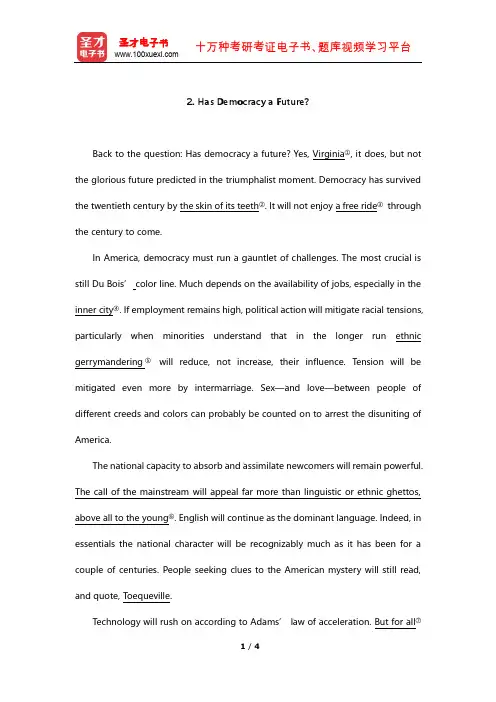
2. Has Democracy a Future?Back to the question: Has democracy a future? Yes, Virginia①, it does, but not the glorious future predicted in the triumphalist moment. Democracy has survived the twentieth century by the skin of its teeth②. It will not enjoy a free ride③through the century to come.In America, democracy must run a gauntlet of challenges. The most crucial is still Du Bois’ color line. Much depends on the availability of jobs, especially in the inner city④. If employment remains high, political action will mitigate racial tensions, particularly when minorities understand that in the longer run ethnic gerrymandering⑤will reduce, not increase, their influence. Tension will be mitigated even more by intermarriage. Sex—and love—between people of different creeds and colors can probably be counted on to arrest the disuniting of America.The national capacity to absorb and assimilate newcomers will remain powerful. The call of the mainstream will appeal far more than linguistic or ethnic ghettos, above all to the young⑥. English will continue as the dominant language. Indeed, in essentials the national character will be recognizably much as it has been for a couple of centuries. People seeking clues to the American mystery will still read, and quote, Toequeville.Technology will rush on according to Adams’ law of acceleration. But for all⑦the temptations of interactivity⑧and all the unpopularity of elected officials, I doubt that Americans will sanction the degradation⑨of representative democracy into a system of plebiscites. Capitalism too will careen on, through downs as well as ups, but laissez-faire ideology will probably wane as capitalists discover the range of troubles the unfettered market cannot solve, or makes worse. Unbridled capitalism, with low wages, long hours, and exploited workers, excites social resentment, revives class warfare, and infuses Marxism with new life. To move along constructive lines, capitalism must subordinate short-term plans and profits to such long-term social necessities⑩as investment in education, research and development, environmental protection, the extension of health care, the rehabilitation of infrastructure, the redemption of the city. Capitalists are not likely to do this by themselves. Long- term perspectives demand public leadership⑪ and affirmative government.From Foreign Affairs, September/October 1997 【参考译文】回到我们原来的问题:民主有前途吗?有!①民主是有前途,但并不像人们在必胜信念、乐观心态盛行时期所预测的那种光辉灿烂的前途。
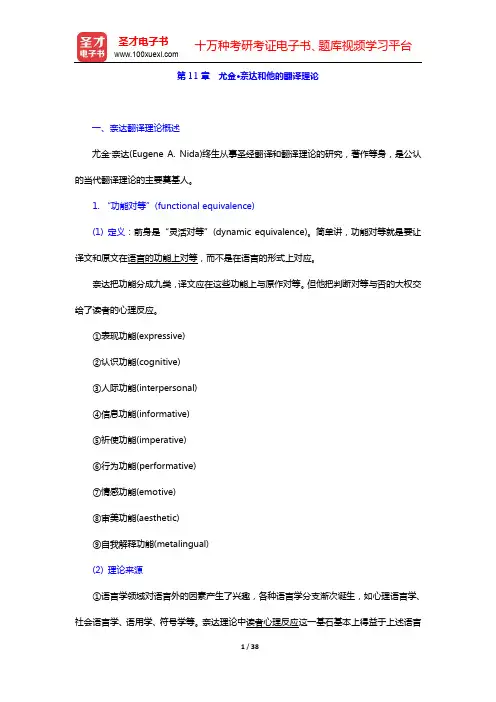
第11章尤金·奈达和他的翻译理论一、奈达翻译理论概述尤金·奈达(Eugene A. Nida)终生从事圣经翻译和翻译理论的研究,著作等身,是公认的当代翻译理论的主要奠基人。
1. “功能对等”(functional equivalence)(1) 定义:前身是“灵活对等”(dynamic equivalence)。
简单讲,功能对等就是要让译文和原文在语言的功能上对等,而不是在语言的形式上对应。
奈达把功能分成九类,译文应在这些功能上与原作对等。
但他把判断对等与否的大权交给了读者的心理反应。
①表现功能(expressive)②认识功能(cognitive)③人际功能(interpersonal)④信息功能(informative)⑤祈使功能(imperative)⑥行为功能(performative)⑦情感功能(emotive)⑧审美功能(aesthetic)⑨自我解释功能(metalingual)(2) 理论来源①语言学领域对语言外的因素产生了兴趣,各种语言学分支渐次诞生,如心理语言学、社会语言学、语用学、符号学等。
奈达理论中读者心理反应这一基石基本上得益于上述语言学方面的发展。
②乔姆斯基(Noam Chomsky)的转换生成语法。
乔姆斯基的早期理论中有关语言表层结构和深层结构转换的模式在很大程度上为奈达描写功能对等提供了工具。
2. 奈达的研究重心的变化(1) 早期的奈达从语言内营造他功能对等的理论,用了诸如转换生成语法、语义成分分析等具体方法来描写他的理论。
发表于1964年的Toward a Science of Translating,主要在语言学的框架下讨论翻译(也涉及了语言外的因素)。
他在该书中将语义细分成语法意义(linguistic meaning)、所指意义(referential meaning)和情感意义(emotive meaning)。
(2) 越往后,奈达就越重视社会文化因素。
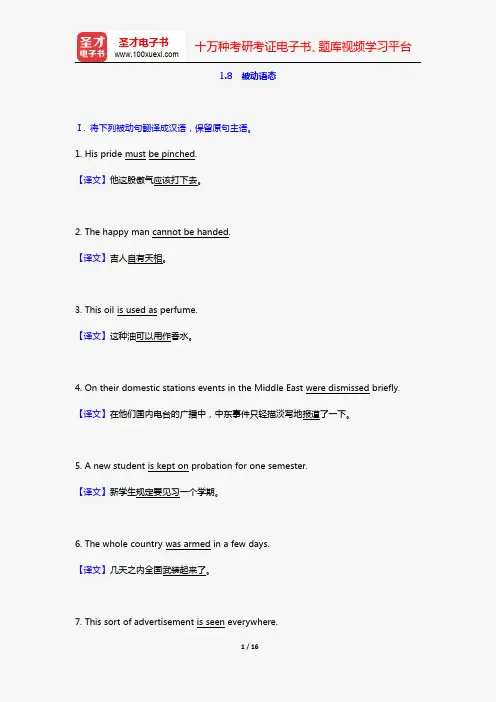
1.8被动语态Ⅰ.将下列被动句翻译成汉语,保留原句主语。
1.His pride must be pinched.【译文】他这股傲气应该打下去。
2.The happy man cannot be handed.【译文】吉人自有天相。
3.This oil is used as perfume.【译文】这种油可以用作香水。
4.On their domestic stations events in the Middle East were dismissed briefly.【译文】在他们国内电台的广播中,中东事件只轻描淡写地报道了一下。
5.A new student is kept on probation for one semester.【译文】新学生规定要见习一个学期。
6.The whole country was armed in a few days.【译文】几天之内全国武装起来了。
7.This sort of advertisement is seen everywhere.【译文】这类广告四处可见。
8.X-ray examination of the chest and heart should be routinely performed.【译文】胸部和心脏X线检查应列为常规。
9.The article had been translated into English,but with little elegance to speak of.【译文】这篇文章译成英语后失去了不少文采。
10.Specifically,clear standards are being setting up for accountability,transparence and participatory governance.【译文】具体而言,明确的标准正在制定之中,为问责制、透明度和参与施政订立明确的标准。
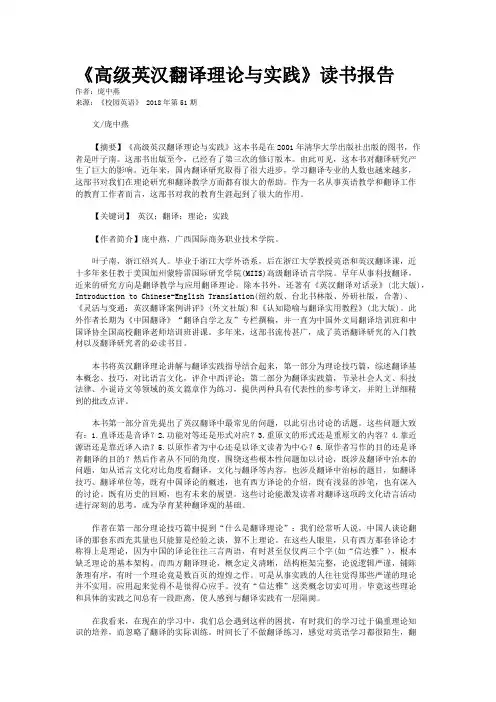
《高级英汉翻译理论与实践》读书报告作者:庞中燕来源:《校园英语》 2018年第51期文/庞中燕【摘要】《高级英汉翻译理论与实践》这本书是在2001年清华大学出版社出版的图书,作者是叶子南。
这部书出版至今,已经有了第三次的修订版本。
由此可见,这本书对翻译研究产生了巨大的影响。
近年来,国内翻译研究取得了很大进步,学习翻译专业的人数也越来越多,这部书对我们在理论研究和翻译教学方面都有很大的帮助。
作为一名从事英语教学和翻译工作的教育工作者而言,这部书对我的教育生涯起到了很大的作用。
【关键词】英汉;翻译;理论;实践【作者简介】庞中燕,广西国际商务职业技术学院。
叶子南,浙江绍兴人。
毕业于浙江大学外语系,后在浙江大学教授英语和英汉翻译课,近十多年来任教于美国加州蒙特雷国际研究学院(MIIS)高级翻译语言学院。
早年从事科技翻译,近来的研究方向是翻译教学与应用翻译理论。
除本书外,还著有《英汉翻译对话录》(北大版),Introduction to Chinese-English Translation(纽约版、台北书林版、外研社版,合著)、《灵活与变通:英汉翻译案例讲评》(外文社版)和《认知隐喻与翻译实用教程》(北大版)。
此外作者长期为《中国翻译》“翻译自学之友”专栏撰稿,并一直为中国外文局翻译培训班和中国译协全国高校翻译老师培训班讲课。
多年来,这部书流传甚广,成了英语翻译研究的入门教材以及翻译研究者的必读书目。
本书将英汉翻译理论讲解与翻译实践指导结合起来,第一部分为理论技巧篇,综述翻译基本概念、技巧,对比语言文化,评介中西评论;第二部分为翻译实践篇,节录社会人文、科技法律、小说诗文等领域的英文篇章作为练习,提供两种具有代表性的参考译文,并附上详细精到的批改点评。
本书第一部分首先提出了英汉翻译中最常见的问题,以此引出讨论的话题。
这些问题大致有:1.直译还是音译?2.功能对等还是形式对应?3.重原文的形式还是重原文的内容?4.靠近源语还是靠近译入语?5.以原作者为中心还是以译文读者为中心?6.原作者写作的目的还是译者翻译的目的?然后作者从不同的角度,围绕这些根本性问题加以讨论,既涉及翻译中治本的问题,如从语言文化对比角度看翻译,文化与翻译等内容,也涉及翻译中治标的题目,如翻译技巧、翻译单位等,既有中国译论的概述,也有西方译论的介绍,既有浅显的涉笔,也有深入的讨论。
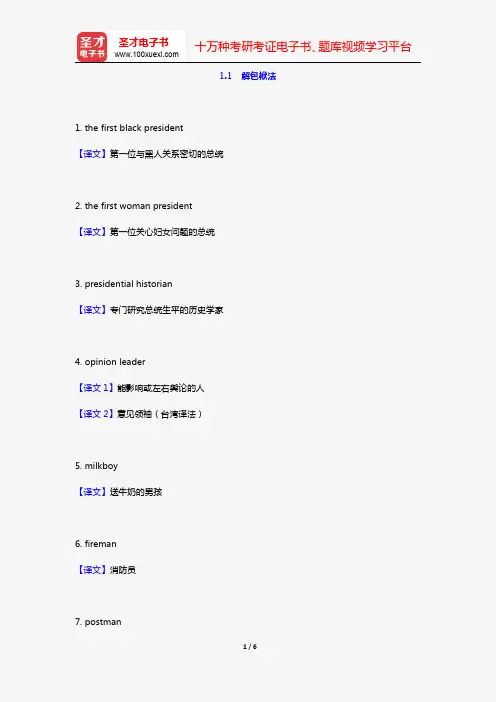
1.1解包袱法1.the first black president【译文】第一位与黑人关系密切的总统2.the first woman president【译文】第一位关心妇女问题的总统3.presidential historian【译文】专门研究总统生平的历史学家4.opinion leader【译文1】能影响或左右舆论的人【译文2】意见领袖(台湾译法)kboy【译文】送牛奶的男孩6.fireman【译文】消防员7.postman【译文】送邮件的人8.sick room【译文】病房9.criminally insane【译文】刑事法庭鉴定为患有精神病10.a morning person【译文】习惯早起的人11.a body shop【译文】车身修理厂(洗车店)12.manage forests sustainably【译文】管理森林,以便使其可以持续发展13.digital gap【译文】数字鸿沟/数位落差(台湾译法)【解析】对于已经形成相对固定的说法的包袱,可不解。
14.peak load【译文】峰值负荷15.satellite communications ground station equipment repairer【译文】卫星通讯地面站设备维修人员16.The divorce is less culturally acceptable in a society that is family-oriented.【译文】在以家庭为中心的社会文化背景下,离婚是难以接受的。
17.I am pleased to be here to offer a U.S.business perspective on one of today’s great quality challenges:building a high skills/high wage workforce.【译文】我很高兴能来此介绍一下美国商界对当今我们在素质方面所面临的挑战的看法,这项挑战就是如何建立一支高技术、高薪金的劳动队伍。
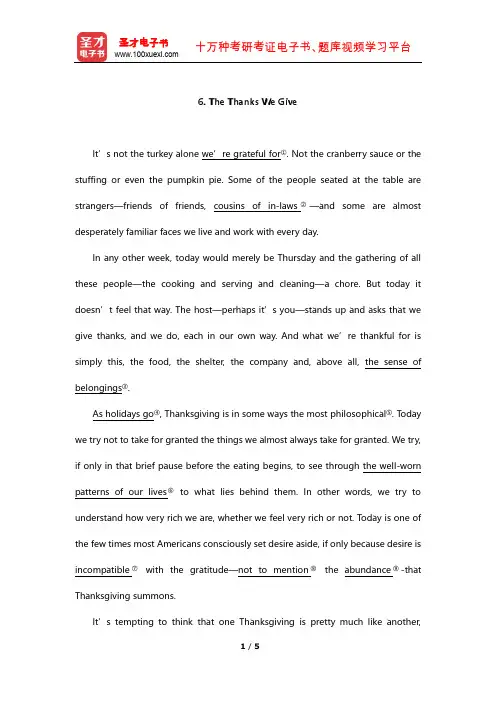
6. The Thanks We GiveIt’s not the turkey alone we’re grateful for①. Not the cranberry sauce or the stuffing or even the pumpkin pie. Some of the people seated at the table are strangers—friends of friends, cousins of in-laws②—and some are almost desperately familiar faces we live and work with every day.In any other week, today would merely be Thursday and the gathering of all these people—the cooking and serving and cleaning—a chore. But today it doesn’t feel that way. The host—perhaps it’s you—stands up and asks that we give thanks, and we do, each in our own way. And what we’re thankful for is simply this, the food, the shelter, the company and, above all, the sense of belongings③.As holidays go④, Thanksgiving is in some ways the most philosophical⑤. Today we try not to take for granted the things we almost always take for granted. We try, if only in that brief pause before the eating begins, to see through the well-worn patterns of our lives⑥to what lies behind them. In other words, we try to understand how very rich we are, whether we feel very rich or not. Today is one of the few times most Americans consciously set desire aside, if only because desire is incompatible⑦with the gratitude—not to mention⑧the abundance⑨-that Thanksgiving summons.It’s tempting to think that one Thanksgiving is pretty much like another,except for differences in the guest list and the recipes. But it isn’t true. This is always a feast about where we are now⑩. Thanksgiving reflects the complexion⑪ of the year we’re in. Some years it feels buoyant, almost jubilant in nature. Other years it seems marked by a conspicuous humility uncommon in the calendar of American emotions⑫.And this year? We will probably remember this Thanksgiving as a banquet of mixed emotions⑬. This is, after all, a profoundly American holiday. The undertow of business as usual seems especially strong this year⑭. The shadow of a war and misgivings over the future loom in the minds of many of us⑮. Most years we enjoy the privacy of Thanksgiving⑯, but this year, somehow, the holiday feels like part of a public effort to remember and reclaim for ourselves what it means to be America⑰.That means giving thanks for some fundamental principles that should be honored every day of the year in the life of this nation—principles of generosity, tolerance and inclusion. This is a feast that no one should be turned away from. The abundance of the food piled on the table should signify that there is plenty for all, plenty to be shared. The welcome we feel⑱ makes sense only if we also extend it to others.From The New York Times, No.25.2004 【参考译文】不单单是因为有①火鸡我们才感恩,也不是因为有红梅果酱、火鸡馅料,甚至不是因为有南瓜派。
1.7状语从句Ⅰ.译成与汉语完全对应的状语1.We shall discuss the problem fully before we make the decision.【译文】我们在作出决定之前要充分讨论这个问题2.If winter comes,can spring be far behind?【译文】冬天来了,春天还会远吗?3.When they approached Trenton,lights were still burning in many of the houses and Christmas parties were still going on.【译文】当他们逼近屈兰敦时,许多房子里仍然灯火通明,圣诞晚会还未结束。
4.我们第二次见面时,我发现她比实际年龄显得老一些了。
【译文】When we met each other for the second time,I found that she looked older than she was.5.直到黄昏降临,他的小孩才回家。
【译文】His child did not come back home until dusk set in.6.They are informal,most likely because they are always in a great hurry.【译文】他们之所以不拘小节,很可能是因为他们总是处于匆忙之中。
7.Because his parents had paved a good way for him,he didn’t worry about it at all.【译文】他之所以一点不急,是因为父母已为他铺好了道路。
8.If the epidemic cannot be controlled effectively,the whole country will come into chaos.【译文】如果这种流行传染病得不到有效控制,整个国家将会陷入一片混乱之中。
第二部分翻译实践篇详解一、非文学类文本(社会人文)1. Van GoghAlthough art historians have spent decades demystifying Van Gogh’s legend ①, they have done little to diminish his vast popularity. Auction prices still soar, visitors still overpopulate Van Gogh exhibitions, and The Starry Night remains ubiquitous on dormitory and kitchen walls②. So complete is Van Gogh’s global apotheosis that③Japanese tourists now make pilgrimages to Auvers to sprinkle their relatives’ ashes on his grave. What accounts for the endless appeal of the Van Gogh myth? It has at least two deep and powerful sources④. At the most primitive level, it provides a satisfying and nearly universal revenge fantasy disguised as the story of heroic sacrifice to art⑤. Anyone who has ever felt isolated and unappreciated can identify with Van Gogh and hope not only for a spectacular redemption⑥but also to put critics and doubting relatives to shame. At the same time, the myth offers an alluringly simplistic conception of great art as the product, not of particular historical circumstances and the artist’s painstaking calculations, but of the naive and spontaneous outpourings of a mad, holy fool⑦. The gaping discrepancy between Van Gogh’s long-suffering life and his remarkable posthumous fame remains a great and undeniable historical irony. But the notion that he was an artistic idiot savant⑧is quickly dispelled by even the most glancing examination of the artist’s letters. It also must be dropped after acquaintingoneself with the rudimentary facts of Van Gogh’s family background, upbringing, and early adulthood.The image of Van Gogh as a disturbed and forsaken artist is so strong that one easily reads it back into⑨his childhood and adolescence. But if Van Gogh had died at age twenty, no one would have connected him with failure or mental illness. Instead he would have been remembered⑩by those close to him as a competent and dutiful son with a promising career in the family art-dealing business. He was, in fact, poised to surpass his father and to come closer to living up to the much-esteemed Van Gogh name⑪.The Van Goghs were an old and distinguished Dutch family who could trace their lineage in Holland back to the sixteenth century. Among Vincent’s five uncles, one reached the highest rank of vice-admiral in the Navy and three others prospered as successful art dealers. Van Gogh’s grandfather, also named Vincent, had attained an equally illustrious status as an intellectually accomplished Protestant minister. The comparatively modest achievements of the artist’s father, Theodorus, proved the exception, not the rule⑫. Although Theodorus was the only one of grandfather Vincent’s six sons to follow him into the ministry, he faltered as a preacher⑬ and could obtain only modest positions in provincial churches. It was for this reason that Theodorus and his new wife, Anna, found themselves in Groot Zundert, a small town near the Belgian border. Vincent was born a few years after their arrival.Van Gogh enjoyed a relatively uneventful childhood save for the birth of fivesiblings (three by the time he was six and two more by his fourteenth year)⑭ and his attendance at two different boarding schools. In rural Zundert he took long walks in the Brabant countryside and developed a naturalist’s love of animals and plants. At his two boarding schools, he excelled at his studies and laid down the foundation for his lifelong facility in French and English. The family’s decision to apprentice him at sixteen to Uncle Vincent’s art gallery in The Hague was far from a nepotistic last resort. Uncle Vincent, called “Cent,” had transforme d an art supply store into a prestigious art gallery and had become a senior partner in Goupil et Cie., one of the largest art-dealing firms in Europe. Vincent had not better opportunity for advancement than working at The Hague branch of Goupil’s. And it was a testament to Vincent’s abilities that the childless “Uncle Cent” took a paternal interest in him and arranged for his position as Goupil’s youngest employee⑮.Vincent’s duties progressed from record keeping and correspondence chores in the back office to dealing, if only in a subordinate way⑯, with clients. This confronts us with the nearly unthinkable image of the “socially competent” Vincent⑰. But such was the case at this stage in his life. The same man whose eccentricity would one day make young girls scream in fright dressed appropriately and charmed customers with his enthusiasm for art⑱. Vincent also ingratiated himself with the local artists of The Hague School and earned his colleagues’respect. Although his status as Uncle Cent’s nephew and protege must have smoothed his way, Vincent appears to have been genuinely dedicated and effectiveat Goupil’s. His boss, Tersteeg, sent home glowing reports⑲ and after four years at The Hague he was promoted to the London branch.From Van Gogh and Gauguin, by Bradley Collins 【参考译文】梵高尽管艺术史家们数十年来一直在淡化梵高传奇的神秘色彩①,但梵高受欢迎的程度几乎丝毫未减。
第5章翻译的基本技巧一、翻译技巧概述翻译的技巧实际就是变通的技巧。
1. 许渊冲教授描写的翻译技巧(1) 加词2+1=2(加词不加意)(2) 减词2-1=2(减词不减意)(3) 换词2+2=3+1(变换符号不变换意思)(4) 移词1+2=2+1(前后移位)(5) 分译4=2+2(一分为二)(6) 合译2+2=4(合二为一)(7) 深化1:2=2:4(具体化)(8) 浅化2:4=1:2(抽象化)(9) 等化2+2=2×2(寻求灵活对等)(10) 一分为四4=1+1+1+1(莎士比亚戏剧中的woe译成离合悲欢。
)(11) 合四为一1+1+1+1=4(鲁迅的“管它冬夏与春秋”译成I don’t care what season it is.)2. 常用的技巧种类繁多,但主要包括词性转换法、加减重复法、反面着笔法、分合移位法以及专门针对句型结构的方法,如定语从句的译法、状语从句的译法、被动句的译法等。
3. 从理清短语中词之间的关系这一角度创造出来的“解包袱法”(unpacking)。
解包袱法1. 对解包袱法的理解解包袱法是指在各类词之间关系复杂时,译者在使用各种翻译技巧前,有必要先将这些缠在一起的关系像解包袱一样解开,然后理顺。
例:美国总统克林顿被称为the first black president。
【解析】美国总统克林顿为白人,因此black在这里不可能是用来表示总统的肤色,black和president两个词之间的关系也就无法用形容词修饰名词的关系来解读,直译为“黑人总统”。
根据上下文情境和背景分析,此处表示的是“与黑人关系紧密”之意,因此译文需加词将black和president之间的语义关系挑明。
案例讨论(1) 名词+名词结构①We want to buy quality steel.【译文】我们要买高质量的钢材。
【解析】quality具有形容词词性,意为“having a high degree of excellence”,因此,翻译为“高质量的”。
1.4反面着笔法⊙正说反译1.a fly in the ointment【译文】美中不足2.call a spade a spade【译文】直言不讳3.be on tenterhooks【译文】坐立不安/六神无主/手足无措4.Bite off more than one can chew.【译文】贪多嚼不烂。
5.Good winner,good loser.【译文】胜不骄,败不馁。
6.predictably【译文】不出所料7.failure【译文】不及格/不履行/没做到/没发生8.supreme authority【译文】无上权威/最高权威9.with dignity【译文】不失体面/不失尊严10.be fatally ill【译文】得不治之症11.soon enough【译文】不久12.keep...within bounds【译文】不失当/不为过/没有扩大化/没有超出范围/没有越过雷池一步13.Danger,Building Site.【译文】工地危险,禁止入内。
14.Hands off.【译文】请勿触摸15.Smoking Free Store.【译文】无烟商场16.Keep Head inside Vehicle【译文】请勿将头伸出窗外。
17.In the absence of the definite information we had to wait a while before makinga move.【译文】由于没有确切消息,我们不得不等一等再做决定。
18.In the long run,there is no doubt that many small companies will be replaced by corporations.【译文】从长远观点来看,十分清楚,很多小公司将被集团公司所取代。
19.His childhood is free from anxiety.【译文】他的童年无忧无虑20.She saw him coming but she ignored him.【译文】她看见他走过来,但不理睬他。
叶子南《高级英汉翻译理论与实践》(第3版)-翻译练习(上)【圣才出品】第二部分翻译实践篇详解一、非文学类文本(社会人文)1. Van GoghAlthough art historians have spent decades demystifying Van Gogh’s legend ①, they have done little to diminish his vast popularity. Auction prices still soar, visitors still overpopulate Van Gogh exhibitions, and The Starry Night remains ubiquitous on dormitory and kitchen walls②. So complete is Van Gogh’s global apotheosis that③Japanese tourists now make pilgrimages to Auvers to sprinkle their relatives’ ashes on his grave. What accounts for the endless appeal of the Van Gogh myth? It has at least two deep and powerful sources④. At the most primitive level, it provides a satisfying and nearly universal revenge fantasy disguised as the story of heroic sacrifice to art⑤. Anyone who has ever felt isolated and unappreciated can identify with Van Gogh and hope not only for a spectacular redemption⑥but also to put critics and doubting relatives to shame. At the same time, the myth offers an alluringly simplistic conception of great art as the product, not of particular historical circumstances and the artist’s painstaking calculations, but of the naive and spontaneous outpourings of a mad, holy fool⑦. The gaping d iscrepancy between Van Gogh’s long-suffering life and his remarkable posthumous fame remains a great and undeniable historical irony. But the notion that he was an artistic idiot savant⑧is quickly dispelled by even the most glancingexamination of the arti st’s letters. It also must be dropped after acquaintingoneself with the rudimentary facts of Van Gogh’s family background, upbringing, and early adulthood.The image of Van Gogh as a disturbed and forsaken artist is so strong that one easily reads it ba ck into⑨his childhood and adolescence. But if Van Gogh had died at age twenty, no one would have connected him with failure or mental illness. Instead he would have been remembered⑩by those close to him as a competent and dutiful son with a promising career in the family art-dealing business. He was, in fact, poised to surpass his father and to come closer to living up to the much-esteemed Van Gogh name?.The Van Goghs were an old and distinguished Dutch family who could trace their lineage in Holland back to the sixteenth century. Among Vincent’s five uncles, one reached the highest rank of vice-admiral in the Navy and three others prospered as successful art dealers. Van Gogh’s grandfather, also named Vincent, had attained an equally illustrious status as an intellectually accomplished Protestant minister. The comparatively modest achievements of the artist’s father, Theodorus, proved the exception, not the rule?. Although Theodorus was the only one of grandfather Vincent’s six sons to follow him into the ministry, he faltered as a preacher? and could obtain only modest positions in provincial churches. It was for this reason that Theodorus and his new wife, Anna, found themselves in Groot Zundert, a small town near the Belgian border. Vincent was born a few years after their arrival.Van Gogh enjoyed a relatively uneventful childhood save for the birth of fivesiblings (three by the time he was six and two more by his fourteenth year)? and his attendance at two different boarding schools. In rural Zundert he took long walks in the Brabant countryside and developed a naturalist’s love of animals and plants. At his two boarding schools, he excelled at his studies and laid down the foundation for his lifelong facility in French and English. The family’s decisi on to apprentice him at sixteen to Uncle Vincent’s art gallery in The Hague was far from a nepotistic last resort. Uncle Vincent, called “Cent,” had transforme d an art supply store into a prestigious art gallery and had become a senior partner in Goupil et Cie., one of the largest art-dealing firms in Europe. Vincent had not better opportunity for advancement than working at The Hague branch of Goupil’s. And it was a testament to Vincent’s abilities that the childless “Uncle Cent” took a paternal interest in him and arranged for his position as Goupil’s youngest employee?.Vincent’s duties progressed from record keeping and correspondence chores in the back office to dealing, if only in a subordinate way?, with clients. This confronts us with the nearly unt hinkable image of the “socially competent” Vincent?. But such was the case at this stage in his life. The same man whose eccentricity would one day make young girls scream in fright dressed appropriately and charmed customers with his enthusiasm for art?. Vincent also ingratiated himself with the local artists of The Hague School and earned his colleagues’respect. Although his status as Uncle Cent’snephew and protege must have smoothed his way, Vincent appears to have been genuinely dedicated and effectiveat Goupil’s. His boss, Tersteeg, sent home glowing reports? and after four years at The Hague he was promoted to the London branch.From Van Gogh and Gauguin, by Bradley Collins 【参考译文】梵高尽管艺术史家们数十年来一直在淡化梵高传奇的神秘色彩①,但梵高受欢迎的程度几乎丝毫未减。
第8章语言前景概念在翻译中的应用翻译中到底哪些语义之外的成分需要在译文中保留这一问题与语篇的文体或风格有关。
杰弗瑞·李奇在他的《小说文体分析》中借用了语言前景(Linguistic foregrounding)这个概念来界定文体,描写了各类文体的共同特点,即偏离常规。
一、语言前景或突显1. “自动化”(automatization)和“前景”(foregrounding)Bohuslav Havranek创造了“自动化”(automatization)和“前景”(foregrounding)这对概念来描写语言。
(1) “自动化”就是指语言表达法在表达意思过程中只是被使用的工具,本身并不引起别人的注意。
该语言表达法是常用的手段,属于一个语言系统内广为接受、频繁使用的手段,特点是平淡无奇。
例:I love you.用在英语的语言环境中,就属于自动化的表达法,因为这是习以为常的说法,别人不会因之大惊小怪。
(2) “前景”不是某一语言体系中广为接受,经常使用的说法,即“不落俗套”,甚至是语出惊人。
例:一位中国小孩在打完电话时对妈妈说“我爱你”,就会引起大多数中国人的特别注意,因为中国人在这种场合不用这个说法,这个说法本身突显于中国语言体系中。
2. 只要一个语言表达法在所处的语境中格格不入、与众不同,就造成前景。
例:在一篇科技文章中某一技术用语并不在语篇中突显,不构成前景,而是自动化。
但将同样一个科技用语突然用到一次日常生活的谈话中,就构成了前景。
3. 李奇认为一个作者要创出自己的文体与风格常会在写作手段上偏离常规,从而造成前景。
偏离常规可以是“质量性偏离”,也可以是“数量性偏离”。
“质量性偏离”(qualitative deviation),指表达法本身偏离语言常规表达模式,违反了“语言法”。
“数量性偏离”(quantitative deviation),即某些用法本身不偏离常规,但其使用的频率超出读者的预期。